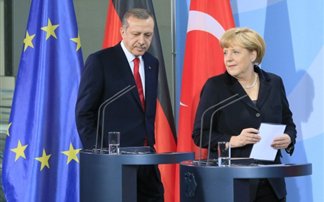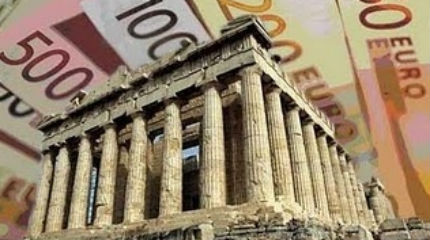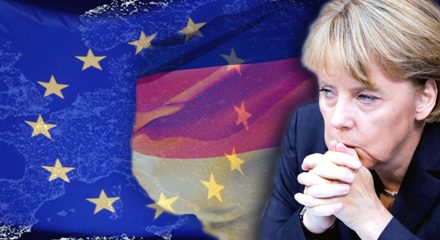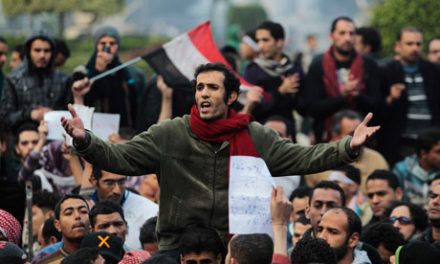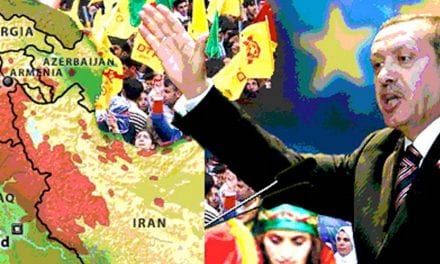Germany, the EU, and Turkey have a lot at stake in current economic, humanitarian, and rule-of-law crisis. Berlin wants to help, but not at any price.
By Marc Pierini, Carnegie Europe
Seldom has a foreign leader been perceived as so adversarial to Germany in recent times. Despite being so much at odds with the country’s ethics and with the EU’s core values—and despite serious rumbling from German opposition parties—Turkish President Recep Tayyip Erdoğan will be received in Berlin with full honors in late September. The question is whether anything good can come out of this mutual effort to improve the Turkey-EU relationship.
Erdoğan’s state visit to Germany is quintessential realpolitik. Significant improvements of the sober type are perhaps in sight, but the background is sensitive on both sides.
Turkey’s economy is battered—not by an international conspiracy, but by a long series of misguided choices on public spending, credit policy, interest rates, and a severe lack of credibility with financial circles. Relations with the United States are at a low point because of Turkey’s decisions to help Iran (in the fraudulent Zarrab-Halkbank case), to procure missiles from Russia (a no-go for the United States and NATO), and to use foreign prisoners as bargaining chips under the cover of an “independent judiciary” that no one believes in. Turkey’s sudden display of affection for the EU and Germany is meant to counterbalance the fallout with Washington, but Ankara’s erroneous policies negatively affect Europe too.
Seen from Berlin, the visit is also no piece of cake.
In 2017, Erdoğan’s repeated comparisons of Berlin’s decisions to Nazisim—going so far as to reference the “gas chambers”—still resonate with German politicians and citizens. To date, there has been no apology.
The EU agreement with Turkey on Syrian refugees has solved some of the related humanitarian issues, but Germany’s generous open-door policy in 2015 took a heavy political toll on Chancellor Angela Merkel and her party. Migration issues have now become a transformative factor across Germany’s political landscape. If this wasn’t bad enough, Turkey’s economic troubles could have serious negative effects in particular for Germany—the EU country with the largest number of companies in Turkey, including Bosch, Mercedes, and Siemens. On top of this, illustrations of the dismal state of the rule of law in Turkey abound: German-Turkish citizens and other emblematic figures like Osman Kavala being jailed for no understandable reason, and reshuffling the editorial board of the iconic daily Cumhuriyet—one of the last remaining free media outlets—last Friday are just two examples.
Yet, both sides want to nurture some sort of normalization of relations. This can occur only if all actors play it right.
On refugees, cooperation will continue in the interest of both parties. The current humanitarian policy works to the satisfaction of both Turkey and the EU, and Germany makes a huge contribution to the deal. What would improve the atmospherics would be to end the permanent belittling of the agreement by the Turkish president. It’s either cooperation or a hostile posture, but not both. As the battle for the Idlib province in Syria turns violent, Germany and the EU will help with the wave of refugees now heading to the Turkish border. Here, too, cooperation is needed, not confrontation, all the more so that EU-origin jihadists are intent to make their way back to Turkey and Europe.
European leaders do not consider any longer Turkey’s accession to the EU as an active proposition. The Turkish leadership should come to realize that its political choices—super-executive presidency with no checks and balances, all-out clampdown on any form of dissent—are totally incompatible with the EU’s core values. There is no way to bring Turkey’s membership bid back on the agenda, especially as the “no accession” camp in the European Council has grown in size. Despite still mentioning “shared values” in its official narratives, Ankara actually feels relieved from what it calls “EU impositions”—in other words, having to abide by EU political norms as part of the accession process.
It is therefore time to give substance to the strategic partnership with Turkey long proposed by Germany and France. Unless Ankara wants to make a hostile narrative the permanent feature of its relationship with the EU, it would be wise to put meat around the bones of this idea.
It starts with economic relations.
Turkey’s economic fundamentals are striking: with no oil and gas, with low savings in relation to GDP, the country is in need of daily short-term borrowings and long-term foreign direct investment. Simply put, Turkey’s trade, borrowing, and investment are primarily done with the EU. So, there is a solid ground for improving the existing Customs Union and deepening economic dialogue.
The hard reality here is that a renewed EU-Turkey Customs Union presupposes a level economic playing field—that is, similar rules in the economic, public procurement, competition, and labor areas—and a trustworthy justice system. Turkey is currently very far from all this. It is time for Ankara to realize that strong economic links with Europe can only rest on rule-based governance. Choices have to be made.
Once this is done, Berlin should accept the launching by the Commission of negotiations to modernize the Customs Union. Talks are technically ready but politically blocked. As already stated by Chancellor Angela Merkel, Germany and the EU have a lot to lose in a collapse of the Turkish economy. They want to help, but not at any price.
Finally, the most difficult aspects of the relationship: style and personal trust. The current AKP-MHP political alliance results in a hostile narrative against the West—and against the EU in particular. That is indeed a sovereign choice, but it will not help Turkey’s economy or its president. Similarly, playing the EU against the United States would be utterly futile. And conspiracy theories—a tool by which populist leaders can blame everybody else but themselves for any adverse development—will not work either.
In Berlin, Paris, and elsewhere across the EU—with the very symbolic exception of Budapest—
President Erdoğan’s democratic credentials are nonexistent after Turkey’s 2017 and 2018 votes. Yet realpolitik gives him the opportunity of securing better economic relations with Europe and to deepen humanitarian and counterterrorism cooperation. Yes, there is a price: restoring rule of law in a number of areas, with both symbolic gestures and substantive improvements. If President Erdoğan takes this path, improvements will follow. If he doesn’t, he will witness his country’s economy sink further.
With the state visit to Berlin, German President Steinmeier and Chancellor Merkel are taking an extraordinarily bold step and facing heavy criticism, including from non-Germans. But they are offering Turkey a unique chance. Take it, but don’t fake it.

